

Climate change: Arctic reindeer numbers crash by half. Image copyright KAJ R.
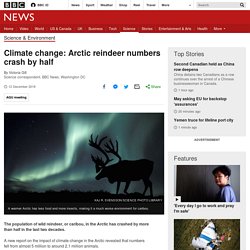
SVENSSON/SCIENCE PHOTO LIBRARY The population of wild reindeer, or caribou, in the Arctic has crashed by more than half in the last two decades. A new report on the impact of climate change in the Arctic revealed that numbers fell from almost 5 million to around 2.1 million animals. The report was released at the American Geophysical Research Union meeting. It revealed how weather patterns and vegetation changes are making the Arctic tundra a much less hospitable place for reindeer.
Alum (aluminum sulfate) turns polluted lakes from green to clear. Is it safe? Seven charts that explain the plastic pollution problem. Image copyright Getty Images Marine life is facing "irreparable damage" from the millions of tonnes of plastic waste which ends up in the oceans each year, the United Nations has warned.
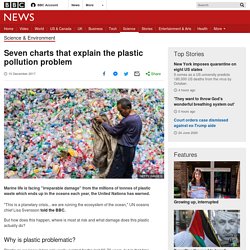
"This is a planetary crisis... we are ruining the ecosystem of the ocean," UN oceans chief Lisa Svensson told the BBC. But how does this happen, where is most at risk and what damage does this plastic actually do? Why is plastic problematic? Plastic as we know it has only really existed for the last 60-70 years, but in that time it has transformed everything from clothing, cooking and catering, to product design, engineering and retailing. 'Shame and anger' at plastic ocean pollution. Image copyright BBC BLUE PLANET II Scientists who advised the Blue Planet II documentary team say they feel "shame and anger" at the “plague of plastic” impacting the natural world.
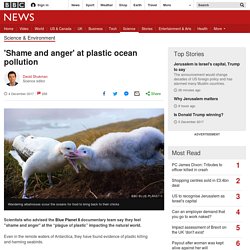
Even in the remote waters of Antarctica, they have found evidence of plastic killing and harming seabirds. Wandering albatrosses – which have the longest wingspan of any birds alive today – are thought to be especially vulnerable. How UK's birds are being affected by a changing climate. Image copyright RSPB Migratory birds are arriving in the UK earlier each spring and leaving later each autumn, a report has confirmed.
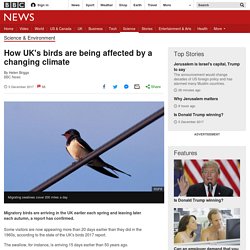
Some visitors are now appearing more than 20 days earlier than they did in the 1960s, according to the state of the UK's birds 2017 report. The swallow, for instance, is arriving 15 days earlier than 50 years ago. Ongoing monitoring is essential to track the future effects of a changing climate on birds, says a coalition of wildlife organisations. IUCN Red List: Wild crops listed as threatened. Image copyright The Crop Trust Wild relatives of modern crops deemed crucial for food security are being pushed to the brink of extinction, according to the International Union for Conservation of Nature.
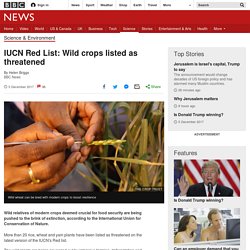
More than 20 rice, wheat and yam plants have been listed as threatened on the latest version of the IUCN's Red list. The wild plants are being squeezed out by intensive farming, deforestation and urban sprawl, say scientists. Modern crops can be crossbred with their wild cousins to safeguard foods. ''To lose them would be a disaster,'' said Dr Nigel Maxted of the University of Birmingham, who is co-chair of the IUCN's specialist group on crop wild relatives. UN commits to stop ocean plastic waste. Scale of 'nitrate timebomb' revealed. Image copyright BGS Huge quantities of nitrate chemicals from farm fertilisers are polluting the rocks beneath our feet, a study says.
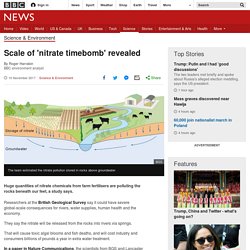
Researchers at the British Geological Survey say it could have severe global-scale consequences for rivers, water supplies, human health and the economy. They say the nitrate will be released from the rocks into rivers via springs. That will cause toxic algal blooms and fish deaths, and will cost industry and consumers billions of pounds a year in extra water treatment. In a paper in Nature Communications, the scientists from BGS and Lancaster University estimate that up to 180 million tonnes of nitrate are stored in rocks worldwide - perhaps twice the amount stored in soils.
Shocking Photographs Show A Sea Of Plastic Pollution In The Caribbean. By 2050, plastic rubbish in the ocean will outweigh fish, and over 5.25 trillion pieces of plastic trash are already in the world's seas.
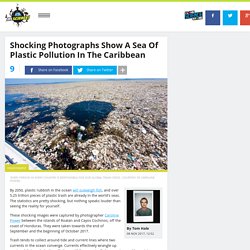
The statistics are pretty shocking, but nothing speaks louder than seeing the reality for yourself. IF 100 PEOPLE LIVED ON EARTH. The Guardian - How a microbead ban could help solve a... Topic 1.1: Environmental Value Systems. Australia's Great Barrier Reef hit by 'worst' bleaching.
Image copyright Getty Images Evidence that Australia's Great Barrier Reef is experiencing its worst coral bleaching on record has renewed calls for the UN to list it as "in-danger".
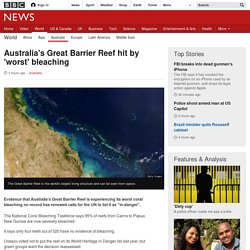
The National Coral Bleaching Taskforce says 95% of reefs from Cairns to Papua New Guinea are now severely bleached. It says only four reefs out of 520 have no evidence of bleaching. Unesco voted not to put the reef on its World Heritage in Danger list last year, but green groups want the decision reassessed. Ash dieback and beetle attack likely to 'wipe out' ash trees in UK and Europe. Almost all the ash trees in the UK and across Europe are likely to be wiped out by a “double whammy” of a bright green borer beetle and the fungus that causes ash dieback, according to a comprehensive new academic analysis.
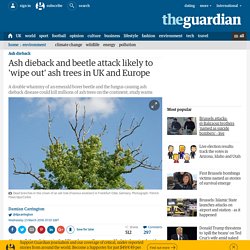
The loss of the ash, one of the most abundant tree species in the UK, would mean losing even more trees than the 15 million elms killed by Dutch elm disease in the 1970s. Ash is the most common hedgerow tree, with 60,000 miles of tree lines. It is the second most common tree in woodland, after the oak, and there are many ash trees in towns and cities. “Between ash dieback and the emerald ash borer, it is likely that almost all ash trees in Europe will be wiped out, just as the elm was largely eliminated by Dutch elm disease,” said Peter Thomas, a tree ecologist at Keele University, UK, who did the analysis, published on Wednesday, in the Journal of Ecology.
This Short Animation Will Change Your Perspective On Time. Evolution and Darwin. Charles Darwin hardly ever used the word "evolution".
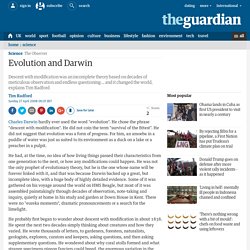
Australia drops Tasmanian Wilderness logging campaign. The Australian and Tasmanian authorities are abandoning their bid to have logging permitted in the Tasmanian Wilderness, a World Heritage site. The decision comes after a report by the UN cultural agency Unesco said the area "should be off-limits to commercial logging in its entirety". If We Cared About The Environment Like We Care About Sports. Bioluminescent Bacteria Could Light Up The Streets Of Paris. A French company is harnessing the power of bioluminescent bacteria to light up public areas. Glowee, a Parisian start-up, plans to use bacteria found in squid to illuminate shop fronts, public spaces, and installations, with the hope of lighting up whole streets with these microbial lamps. As the New Scientist reports, the lights consist of transparent cases filled with a gel containing the bioluminescent bacteria, alongside the sugars and oxygen they need to survive.
Ikea to use packaging made from mushrooms that will decompose in a garden within weeks. LONDON — Ikea is planning to use packaging made with mushrooms as an eco-friendly replacement for polystyrene. The furniture retailer is looking at using the biodegradable mycelium “fungi packaging” as part of its efforts to reduce waste and increase recycling, Joanna Yarrow, head of sustainability for Ikea in the U.K., said. Mycelium is the part of a fungus that effectively acts as its roots. It grows in a mass of branched fibres, attaching itself to the soil or whatever surface it is growing on.
The American company Ecovative developed the product, which it calls Mushroom Packaging, by letting the mycelium grow around clean agricultural waste, such as corn stalks or husks. Over a few days, the fungus fibres bind the waste together, forming a solid shape, which is then dried to stop it growing any further. Yarrow said Ikea was looking at introducing mycelium packaging because a lot of products that traditionally come in polystyrene cannot be recycled with ease or at all. Shell being sued in two claims over oil spills in Nigeria.
Image copyright Reuters Oil giant Shell is being sued in London for the second time in five years over spills in the Niger Delta. Two communities are claiming compensation and want Shell to clean up their land. Shell said it is at an "early stage" in reviewing the claims and that the case should be heard in Nigeria. The Ogale community of about 40,000 people in Rivers State, on the coast of Nigeria, who are mainly farmers or fishermen, are some of the claimants. Their case is being handled by law firm Leigh Day. UK flooding: How a town in Yorkshire worked with nature to stay dry. While the sodden, submerged North of Britain was, literally, wringing out the old year last week, one notorious Yorkshire flood blackspot was celebrating staying dry – despite having been refused a multimillion pound defence scheme. Pickering, North Yorkshire, pulled off protection by embracing the very opposite of what passes for conventional wisdom.
On its citizens’ own initiative, it ended repeated inundation by working with nature, not against it. Its success, and that of similar schemes across the country, should be at the heart of the “complete rethink” of policy being officially promised in the aftermath of last month’s floods – which cost the country at least £5 billion – as climate change threatens to make them increasingly commonplace. And it ridicules an increasingly-voiced contention that these were largely caused by what one columnist called “militant environmentalism” enforced by “green zealots who put protected species above people”.
Play Video Close. France Declares All New Rooftops Must Be Topped With Plants Or Solar Panels. A new law recently passed in France mandates that all new buildings that are built in commercial zones in France must be partially covered in either plants or solar panels. What's the carbon footprint of ... email? Future - Science & Environment - Why whale poo is good for the oceans... and us. Think dairy farming is benign? Our rivers tell a different story. Eat less meat and fish, drink less milk. No request could be simpler, or more consequential. Nothing we do has greater potential for reducing our impacts on the living planet. Yet no request is more likely to elicit a baffled, hurt or furious response.
This point comes across with astonishing force in the film Cowspiracy. I would question some of the figures it uses, but its thesis – we just don’t want to talk about it – is undeniable. Climate change, water use, forest destruction, river pollution, floods, dead zones in the sea: the impacts of animal farming are massive and global; in many cases greater than those of anything else we do. Livestock keeping is so embedded in our cultural and religious identity that to challenge it is, it seems, to attack the foundations of society. Ral worldwide threatened by bleaching - NOAA - BBC News. Corals worldwide are at risk from a major episode of bleaching which turns reefs white, scientists have confirmed.
Ecosystems and Ecology. Biodiversity and Conservation. Water, Food Production Systems and Society. Soil Systems and Society. Atmospheric Systems and Society. Climate Change and Energy Production. Human Systems and Resource Use. Fiji: Litterbugs face name and shame campaign - BBC News. Fiji's government is rolling out a name and shame campaign to try to deal with a growing litter problem, which the prime minister has called "a disgrace". The two-stage scheme will first rely on locals to photograph or film people as they drop rubbish, and send the footage to a dedicated government unit, the Fiji Broadcasting Corporation reports.
The images will then be used to prosecute those caught in the act. "As an incentive, for posting these photographs and videos, those citizens who wish to can apply for and be eligible for a percentage of the fines as a cash reward," says Environment Minister Parveen Kumar. The second stage will involve naming and shaming offenders in the national media. Earlier this month, Prime Minister Frank Bainimarama berated "unthinking and selfish" Fijians for dumping rubbish along some of the country's most beautiful routes and beaches, describing it as "a national embarrassment". China Tianjin blasts: Evacuations as sodium cyanide found - BBC News.